BAR FLYER
INCREASING OUR IMPACT ON OUR COMMUNITY
BY JUDGE ASHLEIGH PARKER DUNSTON | WAKE COUNTY BAR ASSOCIATION & TENTH JUDICIAL DISTRICT BAR PRESIDENT
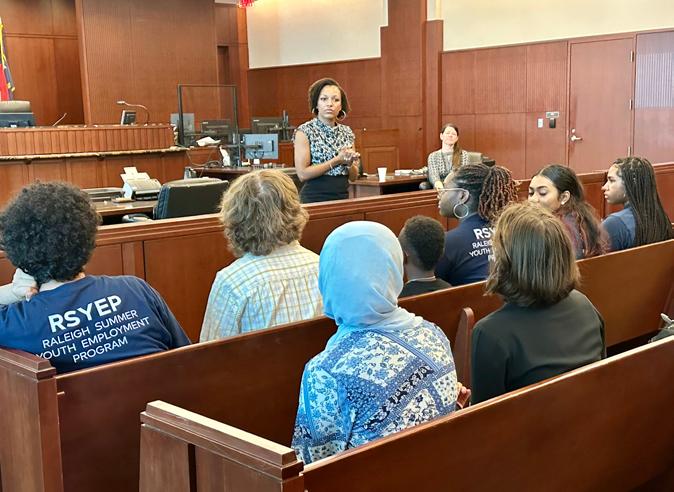
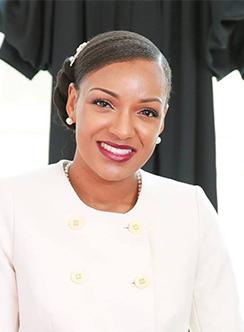
MAYA ANGELOU ONCE SAID that, “I have found that among its other benefits, giving liberates the soul of the giver.”
If you recall, I stand firm in my belief that we possess the greatest group of attorneys in North Carolina as well as the nation. It is more than just our acumen in the courtroom or for our clients – it is our passion and care for the community. We live by the scripture, “To whom much is given, much is required.”

(Luke 12:48)
Our bar is full of individuals who strive to be “servant leaders” who put the needs of others first and empower them to achieve their goals. I’m so impressed and grateful for our Public Service Committee, YLD and those of you who have volunteered and been so active this year in reaching members of our community and this issue of the Bar Flyer will highlight those amazing efforts.
Most recently, our historic Lunch With A Lawyer Program ramped up our impact under the leadership of Meghan Knight. This program began with a vision from Paul Suhr (more than 25 years ago) to offer high school students the opportunity to meet and have lunch with attorneys from our bar. It has continued to shift and mold throughout the years and this year consisted of City of Raleigh Summer Youth Employment Program participants enjoying a panel and lunch with attorneys at Campbell Law School and then coming to the courthouse for a mock trial.
There is nothing I love more than conducting a mock trial and there’s nothing better than to have the opportunity to transform a courtroom into a place of learning for young people. I believe positive exposure to our justice system at an early age could prevent negative consequences later. It’s also a great opportunity to demonstrate the many other professions that make our system work aside from attorneys and judges. After a robust “trial” and “Law and Order” theme song interlude, the jury convicted the “defendant” of robbery. The kids, staff and attorneys who participated had a blast and it served as a reminder to all of us how intelligent and adept our kids are and was a welcome reminder that our future is bright!
There’s nothing more rewarding than giving back to our community and serving those who need us most. If you’re not feeling fulfilled, I would strongly suggest that you look for ways to help someone. If you’re interested in serving and/or looking for more opportunities to do so, please join our Public Service Committees and sign up for service events in our semi-monthly email blasts! Your gifts and talents are needed and necessary to better our community and increase our impact! WBF
UPCOMING EVENTS
TENTH JUDICIAL DISTRICT BAR FALL SWEARING-IN |
September 28 | 2 p.m. | Raleigh
WCBA MEMBERS-ONLY OYSTER ROAST
September 28 | 5 p.m. | Raleigh
2023 WCBA PROFESSIONALISM ROUNDTABLE
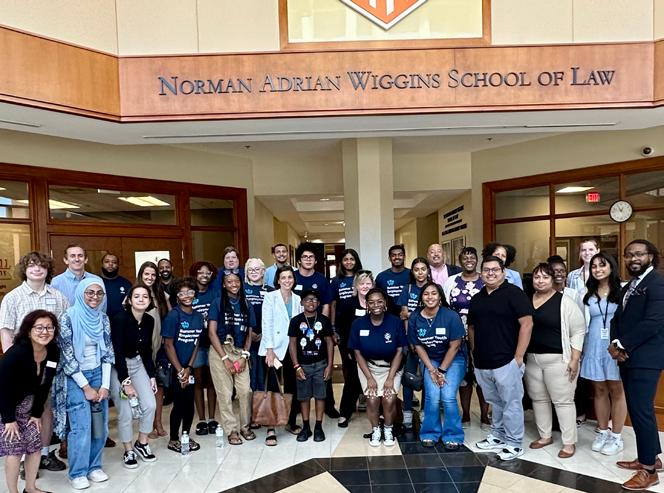
OCTOBER 3 | 12:45 P.M. | RALEIGH
2023 WCBA FAMILY PICNIC
October 6 | Raleigh
PROFESSIONALISM FOR NEW ATTORNEYS
October 11 | Raleigh
INSIDE THIS ISSUE
2 A NOTE FROM THE EXECUTIVE DIRECTOR
3 2023 SCHOLARSHIP WINNERS
3 A RENEWED CALL FOR VOLUNTEERISM FROM THE DIVERSITY, EQUITY AND INCLUSION COMMITTEE


6 SEASONS OF VOLUNTEERING
8 PROFESSIONALISM IN A WFH CULTURE
9 DIRECT EXAMINATION
10 THE UNSEEN BENEFITS OF VOLUNTEERISM
12 WCBA TENNIS TOURNAMENT
13 WELCOME NEW MEMBERS

the Correlation
Volunteering and Happiness?
....................................................14 VOL. LIX • ISSUE 3 | THIRD QUARTER 2023 Visit our website: www.wakecountybar.org 919.677.9903 phone
What is
Between
Denise Stewart
WAKE BAR FLYER
VOL. LIX | No. 3 | THIRD QUARTER 2023
Presidents
JUDGE ASHLEIGH P. DUNSTON, WCBA & TENTH J.D. BAR
Presidents-elect
SARAH PRIVETTE, WCBA
JAMES HASH, TENTH J.D. BAR
Secretary
MEREDITH PACE BREWER
Treasurer
ELYSIA PRENDERGAST-JONES
Immediate Past Presidents
YVONNE ARMENDARIZ, WCBA
DAYATRA T. MATTHEWS, TENTH J.D. BAR
Board of Directors
KRISTEN L. BEIGHTOL
DAVID R. BOAZ
TIFFANY G. COX
JAKE EPSTEIN
JUDGE SAM HAMADANI
LEANOR B. HODGE
JOHN HOOMANI
ERIKA N. JONES
JENNIFER M. JONES
DEAN J. RICH LEONARD (EX OFFICIO)
KELLIE MYERS
WILL OWENS
STEPHANIE N. ROBINSON
KENDRA STARK
PATRICK WILLIAMS
Young Lawyers Division President
JACOB M. MORSE
Young Lawyers Division President-elect
CARLY G. BAKER
Executive Director

WHITNEY D.G. VON HAAM
Communications
AMY DAVIS
Wake Bar Flyer Designer
ANNE R. STRICKLAND
Tenth Judicial District Bar Councilors
JULIE L. BELL
HEIDI C. BLOOM
WALTER E. BROCK
ASHLEY H. CAMPBELL
KATHERINE A. FRYE
KIMBERLY A. MOORE
JUDGE ROBERT B. RADER
WARREN T. SAVAGE
© 2023 Wake County Bar Association & Tenth Judicial District Bar.
VOLUNTEERING AS A PRIORITY
BY WHITNEY D.G. VON HAAM | WAKE COUNTY BAR ASSOCIATION
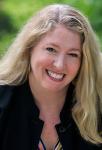
MY PARENTS RAISED ME TO BE a stalwart volunteer in my community. As the daughter of a lawyer and a social worker, this was instilled through words and actions, and as I established myself in Raleigh more than 20 years ago, it was the way I became attached to my new hometown, made friends and established myself as a leader. Since one of my first jobs was as a camp counselor with the Boys & Girls Club in Lancaster, Pa., I knew that my passion was focused on helping and supporting children.
As a volunteer, I have made my commitments to those organizations as high of a priority as my work. In practice that means if I already have a volunteer commitment on my calendar, a work opportunity does not take precedence, except in the most dire of circumstances. Through this commitment, I’ve become known as a volunteer that can be counted on, shows up and completes what I say I am going to do. When I put my executive director hat on, those are the most essential elements that we use to assess our volunteers, and we’re so fortunate that so many of our WCBA members and volunteers share that passion and commitment. However, there has been another benefit in balancing my work life with my volunteer life: I never get too far away from the perspective of our members. Sometimes, work rears its ugly head because of circumstances beyond our control, and in those times, volunteer responsibilities need to take a backseat. I’ve been there when it has happened to me, and I’ve been the staff person that has had to reach out to an overwhelmed volunteer and offered a white flag.
Luckily, your WCBA staff all share a passion for volunteering, which helps make all of us cognizant of the constraints that can happen. If you ever find yourself in a WCBA position and need to push the “I need help” button, know that it will be met with empathy and understanding. We’re here to support you in the best of days as well as the hardest of times.
And, if you only have an hour or two here and there, the WCBA offers many options that are limited time, one-day options, too – We’ll see you out there! WBF
2023 SCHOLARSHIP WINNERS
THE WAKE COUNTY BAR ASSOCIATION FOUNDATION is pleased to announce UNC Law 3L student Briahna Koegel and Campbell Law 3L student Scott Daubenspeck are the 2023 recipients of the WCBA Foundation Memorial Fund Scholarship. The Foundation has awarded scholarships to law students with Wake County ties since 1989.
Scholarship funding has been sustained by events, private contributions and late fees from mandatory Tenth Judicial District Bar dues. Foundation leaders presented Kogel and Daubenspeck with checks at the WCBA July Luncheon on July 11. WBF
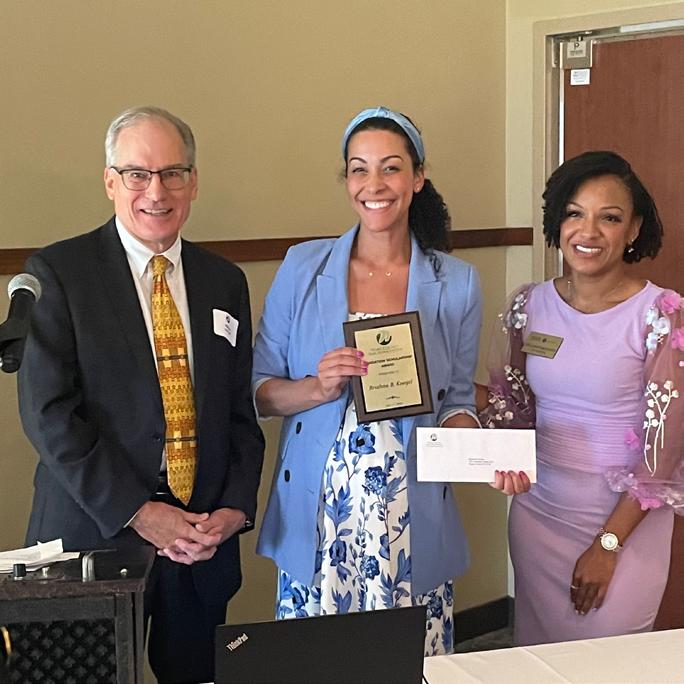
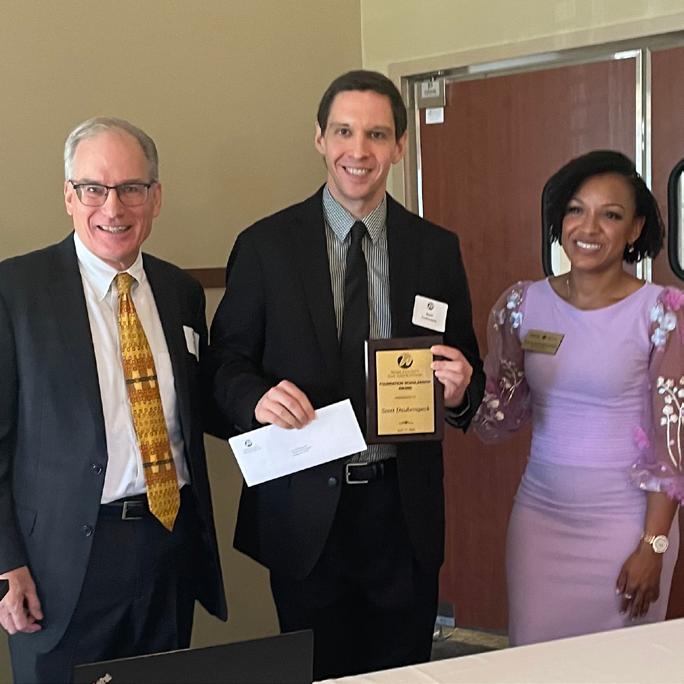
A RENEWED CALL FOR VOLUNTEERISM FROM THE COMMITTEE FOR DIVERSITY, EQUITY AND INCLUSION
 COMPILED BY NIYA FONVILLE SWINT | LEGAL AID OF NORTH CAROLINA & XAVIER MCLEAN | YOUNG MOORE & HENDERSON
COMPILED BY NIYA FONVILLE SWINT | LEGAL AID OF NORTH CAROLINA & XAVIER MCLEAN | YOUNG MOORE & HENDERSON
clinics representing minors in need of a judicial bypass, name change clinics and the NCBA’s annual 4-All Day of Service. One member reminded us that you can incorporate service into your daily practice, as they routinely elect not to charge clients who are referred but who cannot afford to pay. How might you be able to integrate volunteerism into your everyday life?
WHY IS VOLUNTEERISM/PRO BONO/COMMUNITY SERVICE IMPORTANT?
When asked to reflect on the importance of service, CDEI members responded:
“We are attorneys because we wish to serve. Pro bono and community volunteerism…connects us with our local community, gives us a sense of purpose and allows us to connect with fellow professionals who are committed to the same goals.”
Life’s most persistent and urgent question is, what are you doing for others?
– Dr. Martin Luther King, Jr.
WHETHER IT IS PRO BONO or non-legal service in the community, unselfish acts provide a large benefit to society. In hopes of increasing an excitement for volunteerism, in the form of community service and pro bono legal services, members of the Committee for Diversity, Equity and Inclusion (CDEI) shared their thoughts on the subject. This article uses a selection of those thoughts to remind the WCBA/Tenth Judicial District of President Ashleigh Parker Dunston’s challenge to increase our impact!
The CDEI members serve our communities in various ways, includes serving on boards, volunteering at the local food pantry and participating in tutoring programs or career days at local middle schools. In addition, several members have been inducted into the annual Pro Bono Honor Society, a recognition by the Chief Justice of the North Carolina Supreme Court. You can find members participating in driver license restoration events, Wills for Heroes, expunction
“Pro bono is critical to ensuring that everyone has access to legal services and representation despite their ability to pay. Particularly because of systemic oppression, the communities who often need legal services are also the ones who most often can’t afford them. It’s essential to me that I utilize my privilege as an attorney to assist people.”
“If an hour or two of my time can impact someone’s life, it would be irresponsible not to try to give that.”
“I feel extremely privileged to be an attorney in North Carolina, and I believe part of that privilege entails giving back to the communities in which we serve. I think it is important for the legal community not to be viewed as an “elite,” removed community, but one that uses its skills and knowledge to better serve those in the local community, whether through regular practice or volunteerism.”

WHAT WAS YOUR MOST MEMORABLE EXPERIENCE?
As lawyers we are servant leaders. Our community engagement creates trust of our profession with the public, allows us to strengthen our relationships with our communities and helps bridge the access to justice gap. Some of the CDEI’s
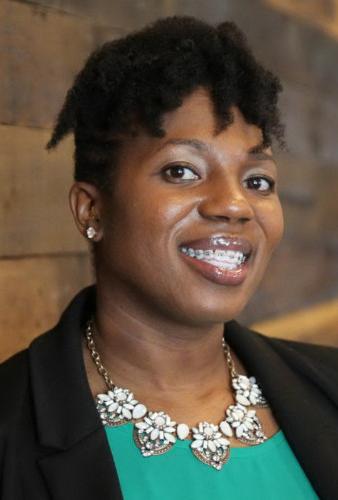
PAGE 3 WAKE BAR FLYER • THIRD QUARTER 2023
Swint
McLean
CONTINUED ON NEXT PAGE
most memorable volunteer experiences include:
“Securing private [school] placement and fees for a parent who was unable to pay for legal representation for her child.”
“Helping a homeless veteran keep his motorcycle. It was the only thing he had left after his life spiraled downward due to mental illness and addiction.”
“Joining fellow WCBA members to spend a morning at Note in the Pocket. To learn about how one person started with an idea to give dignity to children in Wake County to a full-fledged nonprofit, is amazing and profound.”
“I completed a 31 Days of Pro Bono Challenge for the month of October to celebrate National Pro Bono Month—performing at least one pro bono act daily.”
“I represented a young man who needed a declaratory judgment from the court declaring his gender identity to be male in order to correct his gender marker on his Ohio birth certificate. This is an extremely arduous requirement, and this young man had no resources to get a court order here in NC where he lived. Not only was I able to represent him pro bono, but the judge was so supportive and thanked me for this work and said he was humbled to help.”
“I took a pro bono trip to the Mississippi Delta to work on education and
housing policy issues with the Mississippi Center for Justice. I saw schools that were in such poor condition that I thought they were condemned from standing outside. I talked to high school students who were never assigned homework because the school didn’t have enough textbooks for everyone. I talked to residents who barely had working utilities in their home. I also talked to Black residents who didn’t dare look white residents in the eye when passing them on the street. This trip to Mississippi was life-changing because it felt like I was dropped off in another time period. While we’ve made a lot of strides in lessening the disparities caused by race, class and gender, we still have so much work left to do.”
HOW CAN WCBA MEMBERS GET INVOLVED?
In the short time we’ve spent together, we hope you’ve asked yourself the same questions we posed to our fellow CDEI members. If not, then don’t worry, because we are asking you now. How are YOU increasing your impact on the world around you? As members of this global community, it is incumbent upon each of us to find a way to leave it a little better than the way we found it. While volunteerism of any kind is admirable, we hope that this article serves as encouragement to begin (or continue) providing pro bono legal services.
One of the beauties of our profession is that the opportunities to serve are as diverse as the number of practice areas available to us. In addition to the many service opportunities planned by various WCBA committees, such as the Public Service Committee, and the YLD’s Pro Bono and Public Service committees, here are other upcoming opportunities and general resources:
• Capital City Lawyers Association, Youth Law Day 9 a.m., September 9
• “A Taste for Justice” benefiting Legal Aid of North Carolina Raleigh Office | September 16
• NC Pro Bono Resource Center

• North Carolina Bar Foundation Volunteer Programs
• Legal Aid of North Carolina’s Pro Bono Program
• Wake County Legal Support Center
• Disability Rights North Carolina Pro Bono
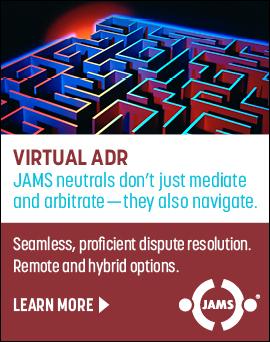
The list provided is intended to be a guide and is by no means exhaustive. We also encourage you to create your own opportunities. Co-author, Niya Fonville Swint, is ringing in her 40th birthday by celebrating all things 40 during the month of September. You’re invited to join the celebration as she seeks to complete 40 hours of pro bono and community service, collect 40 books for Read and Feed (an after-school literacy program that provides meals, tutoring and books to low-wealth children in Wake County) and raise 40 donations for Legal Aid of North Carolina. Will you join Niya?
In parting, we leave you with these words from Justice Ruth Bader Ginsberg, who said “Lawyers have a license to practice law, a monopoly on certain services. But for that privilege and status, lawyers have an obligation to provide legal services to those without the wherewithal to pay, to respond to needs outside [of] themselves, to help repair tears in their communities.” WBF
PAGE 4 WAKE BAR FLYER • THIRD QUARTER 2023
DIVERSITY, EQUITY AND INCLUSION, CONTINUED
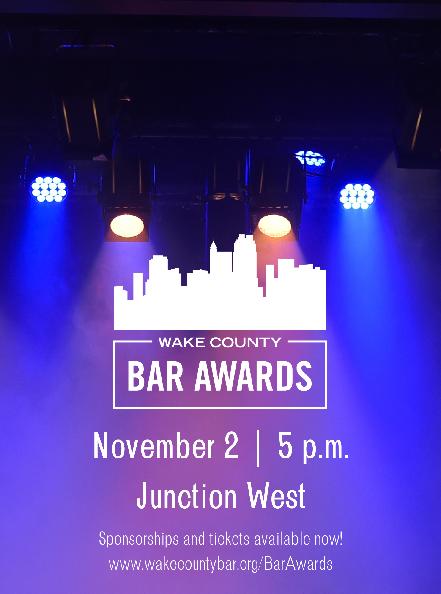
SEASONS OF VOLUNTEERING
BY MARY CELESTE SKINNER | MCKNIGHT LAW, YOUNG LAWYERS DIVISION & PUBLIC SERVICE COMMITTEE

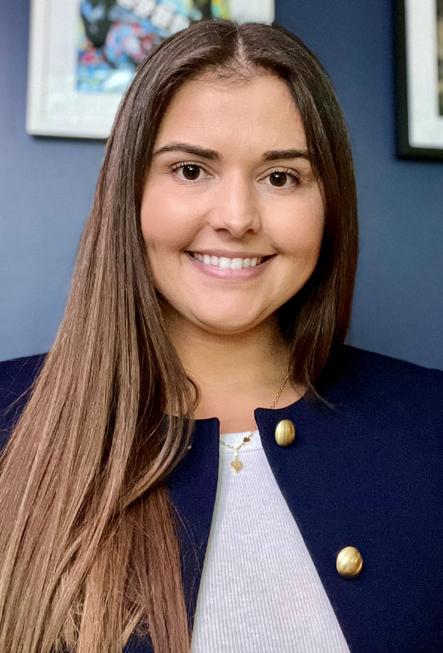
THE PUBLIC SERVICE COMMITEE and the Young Lawyers Division is on fire with volunteer work in 2023. We work hard at demanding jobs, but we are making volunteer events a priority. For the Public Service Committee, it’s in our name, we are working hard for the public we serve. The YLD is consistently meeting and planning regarding how we can give back to our community. We have full participation and dedication to public service events. We are holding each other accountable for event planning and participation.
PUBLIC
SERVICE COMMITTEE
Our WCBA Day of Service in June was a huge success with our group of volunteers at Note In The Pocket. Our group filled a truck with recyclable clothing before sorting hundreds of donated garments. NITP provides free clothing to Wake County families in need with dignity and love.
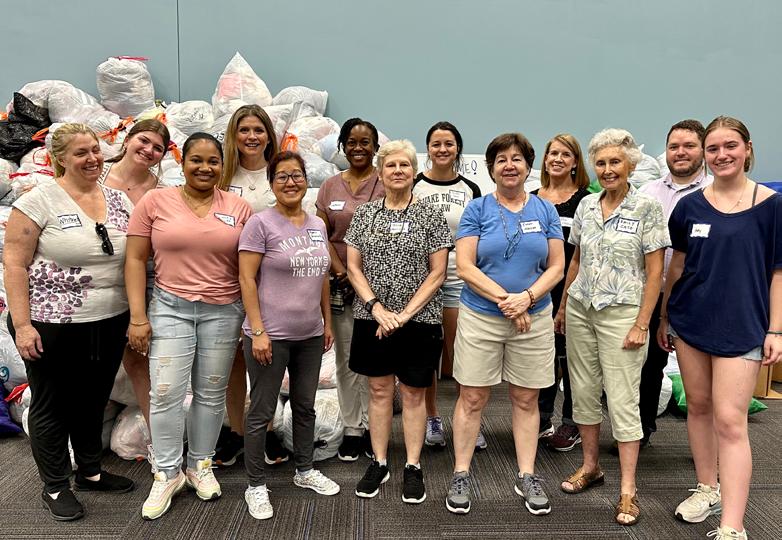
It was an amazing afternoon in June at Legal Aid of North Carolina when our volunteers rang up dozens of local people in need of legal advice for Lawyer on the Line. Public Service Committee members were able to directly advise those who might not otherwise have legal representation.
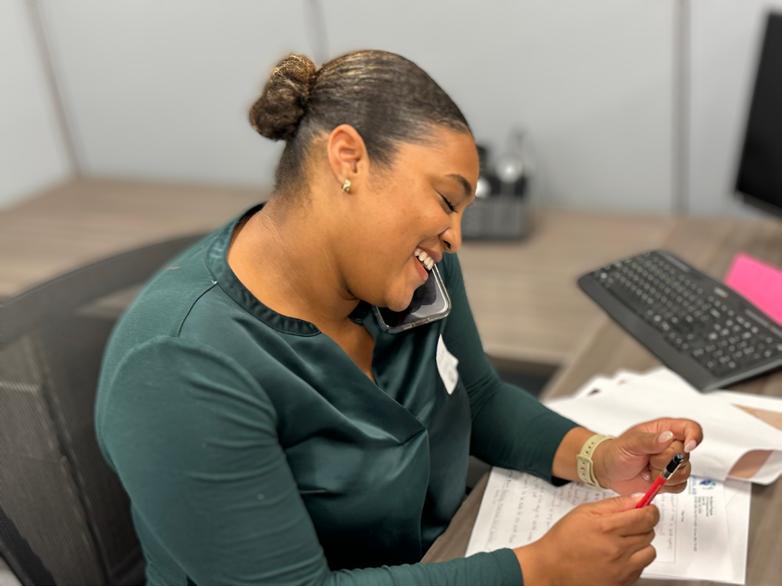
YLD
In May, the YLD also organized and attended a free legal answers Empower Hour and provided free legal advice to people who cannot afford to hire a private attorney. Together a group of private practice attorneys answered various legal questions from all areas of practice.
In June, the YLD’s Public Service Committee joined a food drive with the Food Bank of Central & Eastern North Carolina. Together with other volunteers, YLD members helped serve lowincome people in over 30 North Carolina counties and provided 12,638 meals for North Carolina residents.
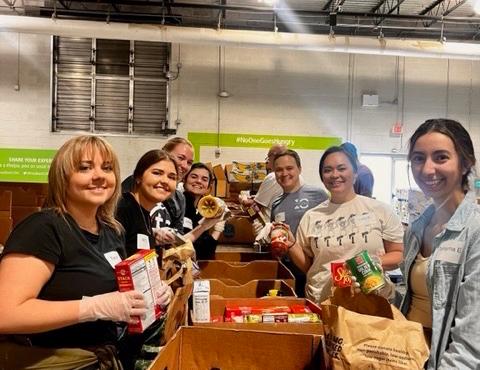

A School Supplies Drive this summer brought in boxes of hundreds of donated school supplies for WakeEd Partnership’s Tools4Schools. This organization provides free classroom supplies for nearly 11,000 teachers in North Carolina’s largest school district to ensure that all students in the Wake County Public School System have the supplies they need to focus on learning.
It is SO hard for SO MANY people to have a roof over their heads and food in their mouths. We are feeding folks and providing access to justice. This is a group of lawyers and leaders. Lawyers go to law school to help people. In legal practice there’s often a feeling of emptiness and wanting for a purpose. Our dedication to public service events helps keep us going and leading future lawyers to keep what Wake County Bar Association has kept up for so long. I would not want to practice anywhere else! WBF
PAGE 6 WAKE BAR FLYER • THIRD QUARTER 2023
Skinner

B r o n z e $ 2 5 0 S i l v e r $ 5 0 0 G o l d $ 1 , 0 0 0 P l a t i n u m $ 2 , 5 0 0 P r e s e n t i n g S p o n s o r $ 5 , 0 0 0 W E C O R D I A L L Y I N V I T E Y O U T O W H E N S a t u r d a y S e p t e m b e r 1 6 t h , 2 0 2 3 3 . 0 0 P M - 6 . 0 0 P M
A
E
A F U N D R A I S E R F O R L E G A L A I D O F N O R T H C A R O L I N A S U P P O R T I N G J O H N S T O N A N D W A K E C O U N T I E S W H E R E O l d e N o r t h S t a t e F o o d H a l l 6 7 J r . R o a d , S u i t e 3 0 0 S e l m a , N C 2 7 5 6 7 S a v o r d e l i c i o u s f o o d a n d b e v e r a g e s f r o m l o c a l v e n d o r s T I C K E T S : $ 5 0 - A D V A N C E $ 5 5 - D O O R S P O N S O R S H I P O P P O R T U N I T I E S F A C E B O O K C O M / L E G A L A I D N C I N S T A G R A M C O M / L E G A L A I D N C T W I T T E R C O M / L E G A L A I D N C # T A S T E F O R J U S T I C E A l l p r o c e e d s w i l l h e l p s u p p o r t L e g a l A i d o f N o r t h C a r o l i n a
T
S T
F O R J U S T I C E
PROFESSIONALISM IN A WORK FROM HOME (WFH) CULTURE
BY RYAN SHUIRMAN | CRANFILL SUMNER, LLC., PROFESSIONALISM COMMITTEE
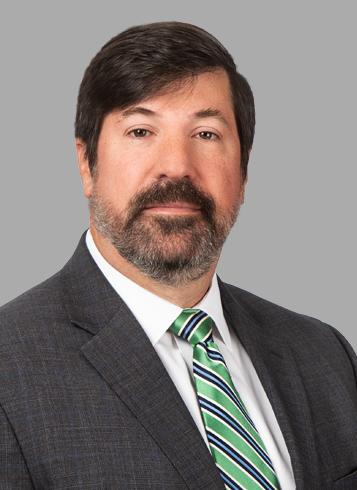

AS WE READ ENCONOMIC NEWS or stories about employers dealing with a tight labor market these days, we are frequently confronted with ideas about work from home, or “WFH,” and whether it is here to stay or whether employers should encourage a return to the office. Even if prior to the pandemic you were a litigator in depositions, mediations or trials several days a week and rarely in your office, you likely have been presented with alternatives to the in-person meetings and in-state and outof-state travel we once took for granted. Some of these alternatives are welcomed and represent an efficiency we may not have fully appreciated before March 2020. We undoubtedly are presented with more models for WFH and demands for flexibility these days than ever in our work lifetimes. What do these models and associated flexibility mean for the promotion of professionalism and a sense of community in our local bar? While the sky surely is not falling, we all should be thoughtful about how to maintain work environments – whether in person or remote – that make professionalism a priority and which promote buy-in through a dedicated effort to connect with those we do not, and will not, see as regularly as we did in the past.
Among the Wake County Bar’s Professionalism Committee, we have frequently discussed the impact of the post-pandemic WFH offerings on the professionalism and mentorship that are integral to the next generation understanding and continuing the principles that make practicing law here so special. One common theme emerges from these discussions: the less isolated lawyers are in our work setting, the more likely we are to collaborate and learn from others and develop a true sense of camaraderie. With such a foundation, and with more intentional engagement, younger lawyers can see the professionalism integral to our practices and recognize, even from a remote workspace, what we used to be able to pick up from simply walking down the halls of our offices and talking with our partners and associates.
We commonly hear concerns about the anticipated results of WFH and the consequences of not being in our colleagues’ physical presence. What happens if we lose those interpersonal connections? What if we only see the younger lawyers in our firms through a Zoom, Teams or Webex meeting? Will we be able to effectively communicate to them the importance of professional courtesies, pro bono work or volunteering in their communities? With the prevalence of WFH policies in this postpandemic world, we have an opportunity to make an even greater effort
to make real connections with younger lawyers and help shape the future office landscape so the next generation is inspired to meaningfully contribute to our judicial district and our larger community as a whole. It’s not too late to be thoughtful about WFH strategies that incorporate the conveniences of reducing commutes and other benefits with the promotion of teamwork and collaboration and everything that made the traditional office setting so valuable in our not-so-distant memories.
There is a reason the Professionalism Committee has mentoring (and the fabulous Campbell Connections program) under its purview, because if mentoring is not a priority, then professionalism will cease to be a priority as well. The same is true for pro bono and volunteer work. If we are going to ensure that the exceptional professionalism exhibited by Wake County and Tenth Judicial District lawyers is carried forward, then “more seasoned” lawyers must make connections with the younger genera tion that has joined us before and since the pandemic. In a WFH environment, we must make an even greater effort to connect with the younger lawyers in our firms, office, and greater community. Law firms would do well by developing strategies for making sure those who are working from home are nevertheless engaged in the firm, with their peers and colleagues, and in their broader community. This goal can be accomplished through scheduling case-related and non-case related meetings, organizing talks by more senior lawyers and staff to build a sense of togetherness and seeking input from stakeholders on what works best in a WFH/remote model.
It is concerning that so much of what has been built upon years of the utmost professionalism in our field seems at risk from an increasingly remote workforce that may have the weakest connection to its employers than we’ve seen in some time, if not ever. A recent article on WRAL. com quoted a statistic that despite anecdotal evidence to the contrary, production from our WFH colleagues was 18% lower as compared to those who come into the office more regularly. This statistic surely does not, in and of itself, signal a need to eliminate WFH policies altogether. Rather, it is reasonable to question whether WFH production would improve with more concrete means of engaging those who are not in the office, and engaging them not only in the firm or office culture, but also in activities outside of work that fulfill pro bono or volunteer goals that serve the lawyer and the community at large. This profession, and the professionalism integral to it, has always been more meaningful with strong interpersonal relationships. The time is now for us to continue to promote professionalism with intentional engagement of those in a WFH setting.
WBF
PAGE 8 WAKE BAR FLYER • THIRD QUARTER 2023
Shuirman
DIRECT EXAMINATION: JILL JACKSON
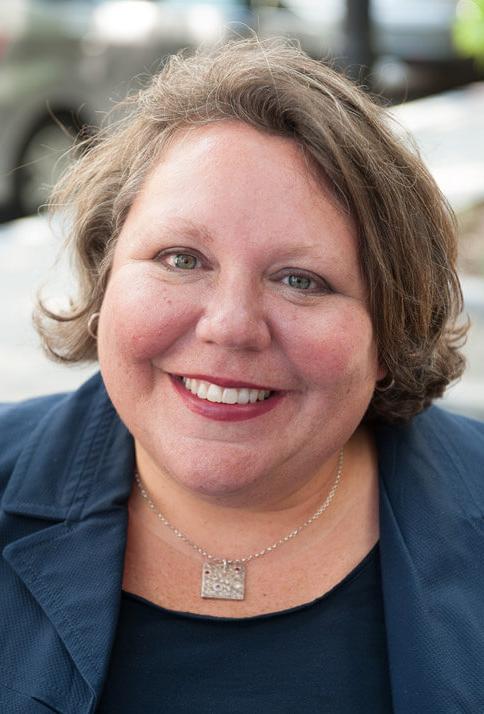
DIRECT EXAMINATION IS THE FIRST opportunity for the jury to meet a witness. An effective lawyer will use the opportunity to personalize the witness, making the witness appear both likeable and credible. At the end of the day, the direct examination is a party’s best chance to tell his or her story. This is the story of Jill Jackson, Attorney, Jackson Family Law.
1. When you were in elementary school, what did you want to be when you grew up?
A lawyer, then the first woman president of the United States. I was really worried that Geraldine Ferraro would beat me to it when she ran as the VP with Walter Mondale when I was 10 years old
2. What was the most important lesson your parents taught you?
That girls can do anything boys can do.
3. Who was your favorite teacher and why?
Tom Zimmerman, my high school band teacher at Columbus High School in Marshfield, Wisconsin. Mr. Z was inspiring and supportive and really cared about his students. My love of Mr. Z and the way he taught band is the reason that I started music education for both of my children at a very young age and why I devote so much time to volunteering with the Enloe Marching Band (my children play marimba and sousaphone).
4. Did you love or hate law school?

I loved it, mostly. There were terrible parts, for sure (Hi, income taxation class, you’re the problem, it’s you.), but I had moved from Minneapolis to Chapel Hill. The weather was beautiful, I was living in a true “college town,” the beach was a day trip away and most importantly, I met my future husband!
5. What was your most embarrassing courtroom experience?
On a rainy day about eight years ago, I tumbled down the marble staircase in the Greene County Courthouse while holding a frilly purple umbrella that said my child’s name in pink flowery letters. I fell right out of my shoes and landed on the floor outside the courtroom door with my skirt up around my waist and the umbrella skidding through the lobby. But I stood up, smoothed down my skirt, put on my shoes and carried that umbrella into court like it never happened . . . . until I needed an MRI on my shoulder about a month later.
6. What was your best courtroom experience?
Oh, hands down, my best courtroom experience happened five years ago in a courtroom at Campbell Law School. I was in my second year of coaching the Ligon Middle School mock trial team (I coached for a total of five years.) and my 13-year-old daughter became irate when the mock trial judge overruled her objection. She strenuously objected, then argued with the judge and “opposing counsel” so fervently that she and the other “lawyer” were called to the bench to review the mock trial competition rules after which the judge sustained her objection! It was the most glorious display of everything I had taught the mock trial kids about objections, rules of evidence and civil procedure combined with her unwavering belief in herself, and her father and I were ridiculously proud. She was totally incorrect and the objection should have been sustained, but man, she was fierce.
7. Why did you become a lawyer?
I became obsessed with Abraham Lincoln at around age four or five and was relentless throughout my childhood about my desire to be a lawyer, then the first woman POTUS, so that I could fight for equal rights. My parents encouraged this obsession by including at least one Lincoln-related historic site in every family road trip and there were a LOT of road trips over the years.
8. What has been the most surprising or unexpected development in your career?
I opened Jackson Family Law in 2018 and have been a solo practitioner since that time – no staff, no associates, literally solo. I love it! I set my schedule and choose my clients so that I have been able to volunteer with the Enloe Marching Band and the Ligon Middle School mock trial team.
9. What is your favorite book?
The Poisonwood Bible by Barbara Kingsolver. I first read it during the summer when I was taking the bar exam and I used to hide it from myself under the couch so that I would stop reading and focus on studying. I read it again a few years ago and it was a totally different experience because I now identify with the mother instead of the daughters.
10. What is your most marked characteristic? Persistence.
11. What is your hidden talent?
I can talk people into doing things they don’t want to do and make them think it will be fun. This is a handy skill as a family lawyer but I use it far more often when I need volunteers for mock trial or marching band.
12. Who are your real-life heroes?
Teachers, family court staff and clerks of court. Those folks perform miracles every day on a shoestring budget with grace, kindness and extraordinary patience.
13. When and where were you happiest?
Anytime I’m at the beach with my husband and kids. WBF
PAGE 9 WAKE BAR FLYER • THIRD QUARTER 2023
Jackson
THE UNSEEN BENEFITS OF VOLUNTEERISM
BY CAMILLE STELL | LAWYERS MUTUAL CONSULTING & SERVICES
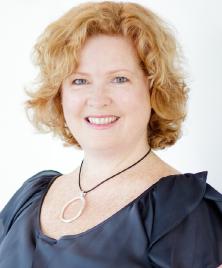
IN THE MID-1980S I graduated from Meredith College and the Meredith College Paralegal Program and began my career as a bright-eyed paralegal. I loved everything about what I was doing, but I especially enjoyed volunteering and building relationships through professional associations.
FUN WITH VOLUNTEER WORK
Sometime during those early years, a group of paralegals and lawyers from the Wake County Bar Association and the Raleigh-Wake Paralegal Association volunteered with a local Boy Scout troop in the Law Explorer program. The Law Explorer program was created to allow high school students to learn various roles in the legal profession.
These students approached the Wake County Bar Association with the goal of participating in a mock trial. Both teenage boys and girls who participated in this project, and parents served as chaperones.
Planning meetings with the paralegals and lawyers took place at Finch’s Restaurant. I’m not the only one who enjoyed starting the day with their famous blueberry pancakes leading to perhaps more planning meetings than might have been necessary.
We ordered a mock trial kit, and we met on weeknights with the kids. We took turns hosting the coaching events at the law firms where we worked. We chipped in for pizza, beer and boxed wine. The beer and boxed wine for us – not the students. Yes, boxed wine was a real thing.
In no time, we were in the Wake County Courthouse coaching and cheering our teams on to victory. The kids had a blast, the parents were pleased as punch and we took pride in our role of helping them accomplish their goal.
Today, as I write this, I wonder if any of those kids went on to paralegal school or law school? Even if they didn’t, they left with a better understanding of our justice system and they had the confidence-building experience of leading a trial team, making arguments in court and hopefully they saw our role as volunteers as something to emulate as well.
WAKE COUNTY BAR ASSOCIATION AND RALEIGH-WAKE PARALEGAL ASSOCIATION

It’s dangerous to name names in case I’m forgetting someone or adding someone to the party who wasn’t there, but the participants included paralegals Laura Powell (Lee), Tricia Diltz (Milward) and Lucia Peel (prior to law school) from Smith Anderson, and Debbie Lawrence, along with lawyers Dan Boyce, John Madden, Paul Ridgeway and Kieren Shanahan. I also believe John Connell was part of this merry band of legal professionals.
At the time, I couldn’t begin to see what a 40-year career looked like, and it certainly never occurred to me that my friends would go on to become outstanding leaders in their field.
The paralegals in this group were among my closest friends and Debbie Lawrence is still my “ride or die.” Laura and Tricia were long-time paralegals at Smith Anderson, and both served in local and state paralegal associations in leadership roles, as well as volunteering within their communities. Lucia went on to law school
and volunteering was in her very nature, especially in her church, the Roanoke River Partners and anything that involved helping pets.
The lawyers rose to the top of their profession as well serving as the Assistant U.S. Attorney EDNC (Dan Boyce), Clerk of Court at the N.C. Court of Appeals (John Connell), practice group leader of the Medical Malpractice Defense team at Smith Anderson (John Madden), Senior Resident Superior Court Judge of the Tenth Judicial District (Paul Ridgeway) and Assistant U.S. Attorney EDNC (Kieran Shanahan).
Camille Stell is the President of Lawyers Mutual Consulting & Services and the co-author of the book “RESPECT – An Insight to Attorney Compensation Plans” published in December 2022. Continue this conversation by contacting Camille at camille@ lawyersmutualconsulting.com or 919.677.8900.
I didn’t find a study that said helping high school students produce a mock trial correlated to winning a judicial election, but it’s no coincidence that those who give of themselves and their time are also those who are preparing themselves for career and life opportunities.
HEALTH BENEFITS OF VOLUNTEERING
Psychology and Aging published a four-year study on the benefits of volunteering in adults age 50-years-old and over. The study showed that those who volunteered at least 200 hours the year prior to the study were less likely to develop hypertension. A CNN Health article reported that volunteering has shown benefit in reducing pain, minimizing stress, improving depression, reducing the risk for cognitive impairment and helping us live longer.
Loneliness and isolation are recognized as epidemics in our world today. Volunteering allows us to feel closer to one another, expand our community and strengthen bonds between co-workers, friends and family. One study found that people who volunteer more than 100 hours a year are some of the healthiest people in the U.S. and find volunteering a way to counteract the effects of anxiety, depression and stress.
CONCLUSION
Volunteerism is the engine that keeps our communities healthy and vibrant and makes us healthier and happier. In my personal experience, volunteering expanded my relationships within the legal community, which in turn helped me as my career developed and expanded my friend circle.
There are so many opportunities for giving back. Find the opportunities that work for you and reap the rewards of volunteering! WBF
PAGE 10 WAKE BAR FLYER • THIRD QUARTER 2023
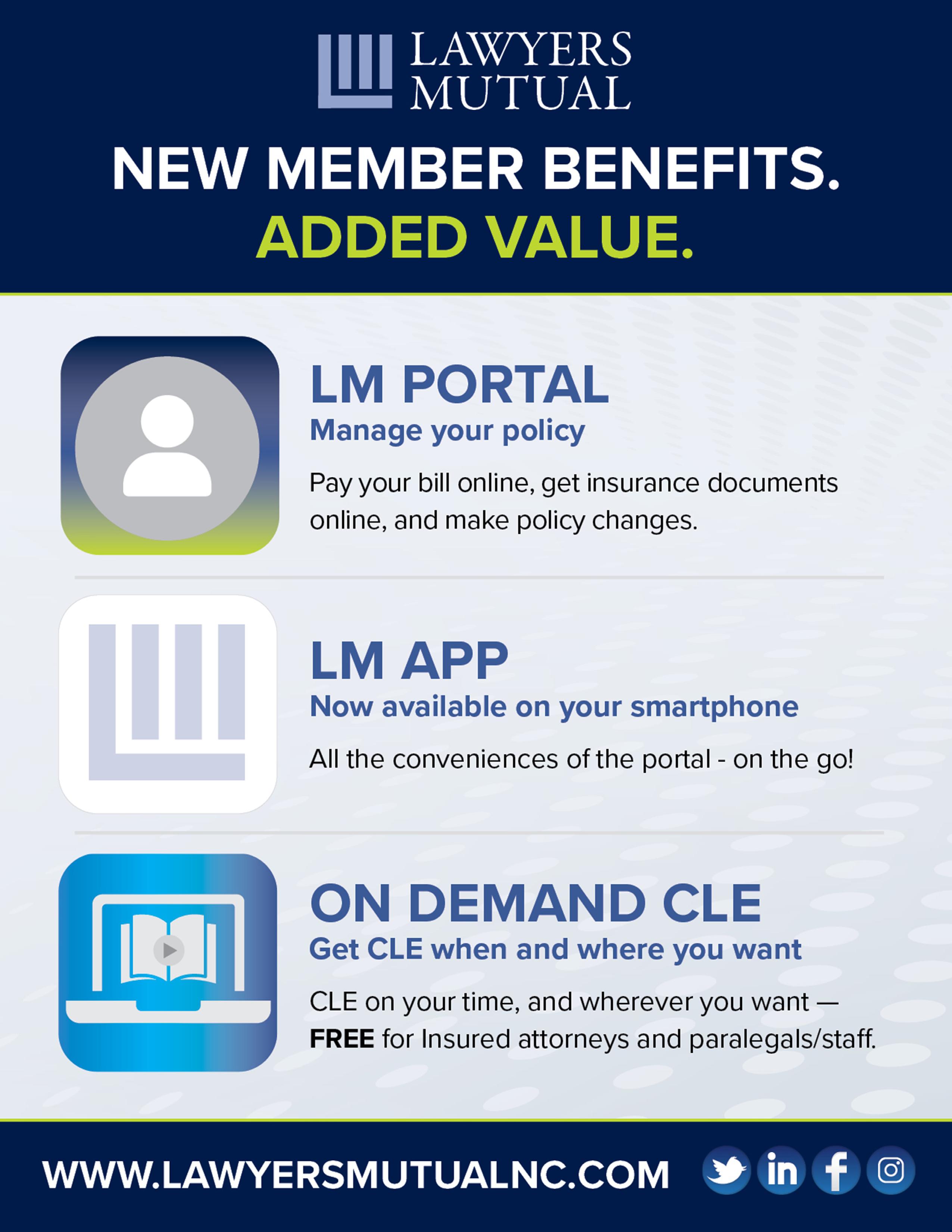
WCBA TENNIS TOURNAMENT | OCTOBER 6

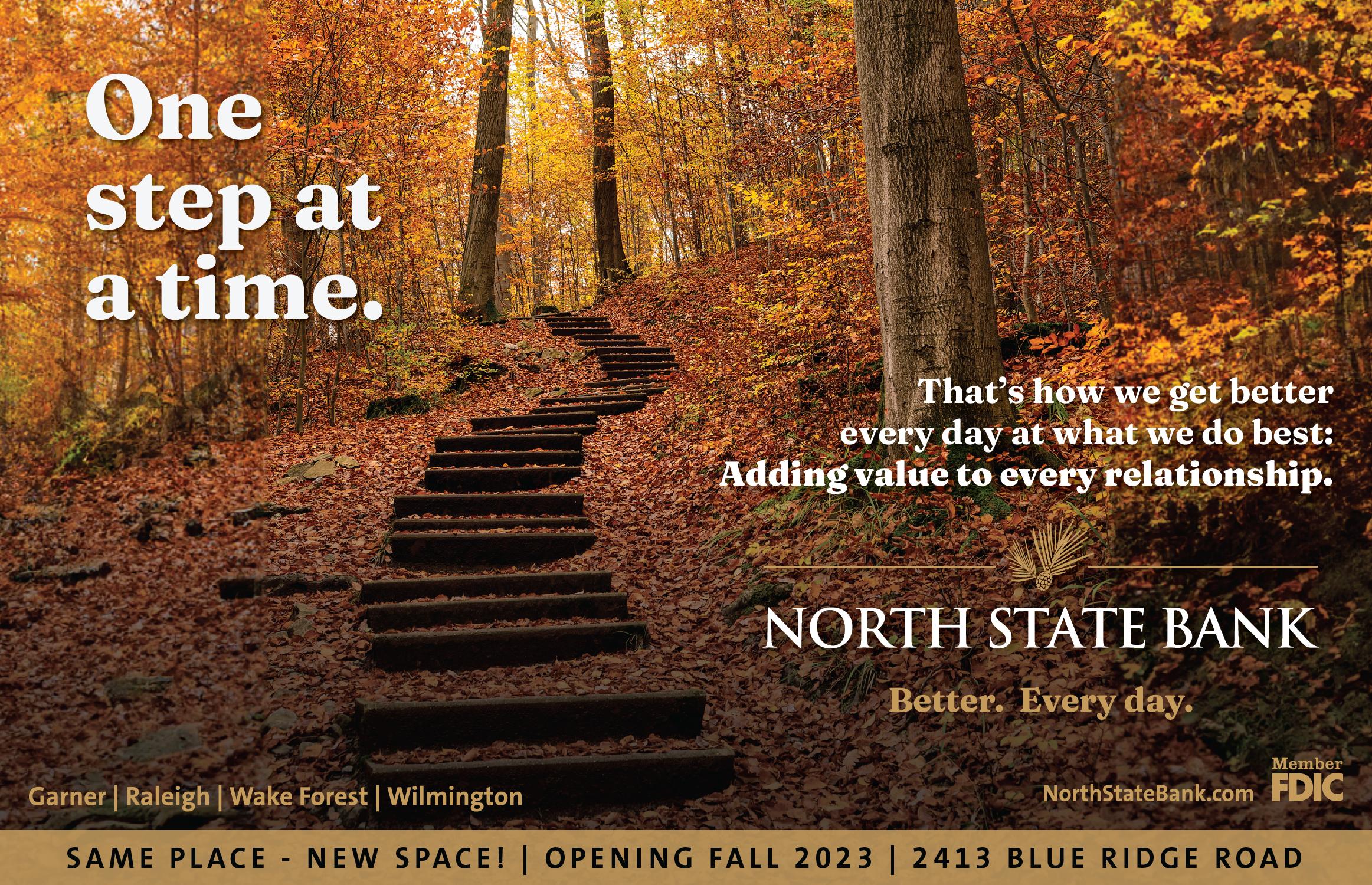
All levels of players are welcome to the WCBA Tennis Tournament on Friday, October 6 at 1 p.m. at the Carolina Country Club. The tournament includes two divisions to encourage men and women of all abilities to participate! There will be a more social Open Division, where you sign up individually and play with a different partner over several rounds of doubles fun. For the more competitive players there is a Champion Division Doubles Tournament, where most players sign up as a team and you keep your partner all tournament.
If you played in high school or beyond and need a partner for the Championship Division, or have any questions, please contact Tennis Commissioner William Plyler at wplyler@millermonroelaw.com with any questions. The tournament is limited to members of the Wake County Bar Association and students at Campbell School of Law. There is a $10 registration fee per player. WBF

WELCOME NEW MEMBERS
WE WELCOME THE NEWEST MEMBERS TO THE WAKE COUNTY BAR ASSOCIATION
Courtney Alaniz | Fragomen Del Rey Bernsen & Loewy LLP
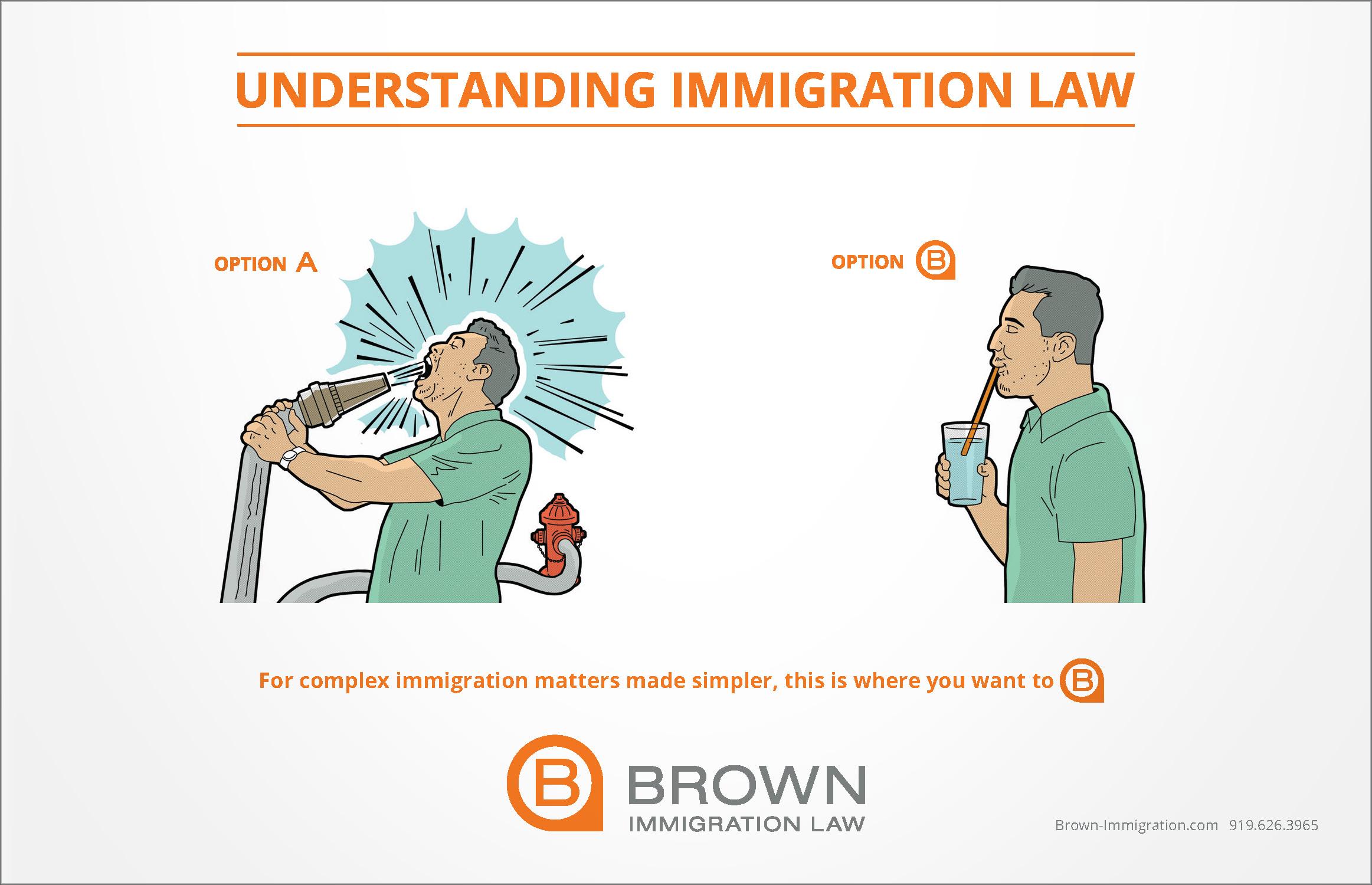
Heather Andrews | Teague Campbell Dennis & Gorham LLP
Jordan Arroyo Barnard | Arroyo Law, PLLC
Jay Basham | BioCryst Pharmaceuticals
Maya Davis | Law Office of James Scott Farrin
Sara Flessner | PPD Inc
William Flowers | NC Department of Justice
William Gaskins | Morris Manning & Martin LLP
Kara Goray | Ogletree Deakins Nash Smoak & Stewart PC
Jamila Horne | Jackson Law PC
Olivia Jamrog | Smith Anderson Blount Dorsett
Mitchell & Jernigan LLP

John Kellam | Manning Fulton & Skinner PA
James Kilbourne | Allen Stahl + Kilbourne
Elise Lane | Cleary Gottlieb Steen & Hamilton LLP
Bryant Madison | NC Department of Environmental Quality
Emily Maggio | NC Court of Appeals
Ryan Mumper | Loebsack & Brownlee PLLC
Karen Rabenau | Stevens Martin Vaughn & Tadych PLLC
Megan Reilly-Dreas | NC Court of Appeals
Colin Russell | NC Association of Realtors
Nicholas Sanders | NC Department of Justice
John Stanford | Stanford Law PLLC
Denise Stewart | Denise Stewart Coaching
Natalia Watkins | Legal Aid of NC
Christopher Wencker | Shoaf and Wencker LLC
Janet Witchger | Hemphill Gelder PC
PAGE 13 WAKE BAR FLYER • THIRD QUARTER 2023
WHAT IS THE CORRELATION BETWEEN VOLUNTEERING AND HAPPINESS?
BY DENISE STEWART | ATTORNEY AND CERTIFIED PERSONAL COACH
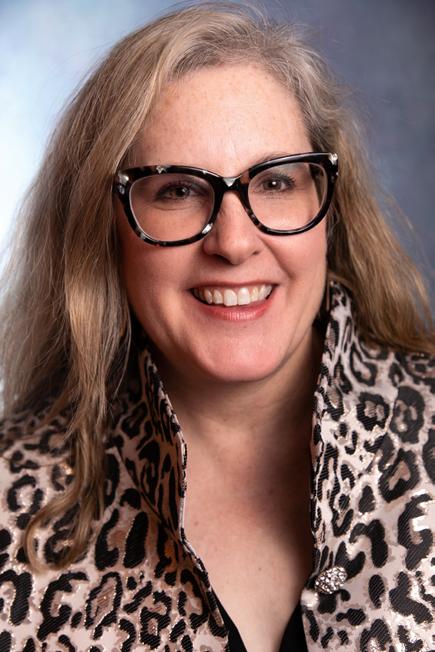
CAN VOLUNTEERING LEAD TO happiness? According to New York Times bestselling author, podcaster and speaker Gretchen Rubin, the answer is unequivocally yes! She has directly stated, “Volunteering to help others is the right thing to do, and it also boosts personal happiness.” How, you might ask? To see the correlation between happiness and volunteering, it is important to dive into what volunteering is AND what is takes to be happy.
Volunteer defined: “To offer to do something without being forced to do it or without getting paid for it,” according to the Oxford Dictionary. Why do people volunteer? Perhaps they want to enhance the community in which they live, give back to an organization that has supported them in the past or care for the wellbeing of those who most need our care (children, victims of domestic violence or animals – for instance). Individuals have a variety of reasons for wanting to volunteer and there is no shortage of places where volunteers are needed in every community.
What does it take to be happy? According to Tal Ben-Shahar, founder of the Happiness Studies Academy, there are five elements that, when experienced together, can lead to happiness. Those five elements form the acronym SPIRE, which stands for Spiritual, Physical, Intellectual, Relational, and Emotional wellbeing.
How does each element of happiness appear when we volunteer? It often depends on the type of volunteering in which we participate; however, there are some basic questions we can use to determine whether the elements exist in the activity we have selected.
1) To assess the spiritual component of SPIRE, ask – What is the purpose of the activity? Who are you supporting? Why does it matter to you and/or to the people you are supporting? If you see the activity as a passion and as aligning with your values, it is more likely to bring you happiness.

2) For the physical component of SPIRE, what are you actually doing during your volunteer time? If it’s a physical activity, then you will move your body, which releases endorphins, and this alone will allow you to feel happier. If it’s a more sedentary activity, will there be a group meal during the activity (so you can focus on nutrition which is important for your body)? Chances are good that whatever activity you complete will be one that will be either a physical or mental challenge so you’ll sleep well that evening – which will allow you to be more rested the next day and more able to focus on whatever you have planned and be happier in the process.
3) When it comes to the intellectual component of SPIRE, are you able to single-task and focus solely on the job at hand? Are you learning something new? Are you adding to your toolkit of things you will be able
to use in the future? Alternatively, are you using your strengths and showing someone how to do something that she will be able to utilize in the future? The main question is whether you can involve your mind in the process. If so, chances are good that you will feel happy having completed whatever task you started!
4) Assessing whether the relational component of SPIRE has been met, are you doing something on your own or with a group? Even if you are the only person working on a part of the project, are there others also working on the project with whom you can discuss the task and/or have a conversation while you work or before/after working? We, as humans, are social beings and volunteering with others to serve a common purpose allows us the opportunity to meet new people or strengthen relationships with people with whom we are already acquainted. Enjoying camaraderie with like-minded individuals tends to increase our personal and professional happiness.
5) The final component of SPIRE is the emotional element. Are you enjoying yourself? Laughing? Crying? No emotion is bad – feel all of them and allow yourself the opportunity to reflect regarding why you might be feeling the way you are feeling. Are you grateful for the opportunity to complete the volunteering task for which you’ve registered? Emotions are contagious, so if we feel good about what we are doing, we can support others in feeling good, too.
An example of volunteering I had most recently was working with my team at Habitat for Humanity. I can, without question, state that happiness was a side-effect of volunteering because all five elements of happiness were present. We were invested in the meaning of our tasks for the day – we got to be part of the process for ensuring a family has a home where they can feel safe (spiritual). We were physically active – all doing different jobs. Some of us worked together, others worked individually. At the end of our time, we were able to see the overall progress – and I know endorphins were released and I also slept like a baby that night (physical)! I had the opportunity to learn a lot about building a home from the people who were onsite – and that’s information I’ll have forever (intellectual). We shared a meal during the day AND we shared stories and pictures of the fun we had during the event (relational). Those of us who were there have deepened our relationships with each other and new relationships were formed as a result (also relational). While I cannot speak for others who were there, I can definitively say that I felt enormous joy being able to help build a home for a family where they can feel safe AND I felt gratitude that I was able to drive back to MY home that evening (emotional).
While all five SPIRE elements lead us to being happier individuals, any one of these can allow us the opportunity to feel happy when we volunteer; therefore, volunteering can indeed lead to happiness. As the Dali Lama said, “I believe the very purpose of life is to be happy . . . I have found that the more we care for the happiness of others, the greater is our own sense of well-being.” Is that not what volunteering is? Caring for the happiness of others? What will your next volunteer activity be?! How happy will you be as a result?! WBF
PAGE 14 WAKE BAR FLYER • THIRD QUARTER 2023
Contact Denise Stewart at denise@denisestewartcoaching. com.
Stewart











 COMPILED BY NIYA FONVILLE SWINT | LEGAL AID OF NORTH CAROLINA & XAVIER MCLEAN | YOUNG MOORE & HENDERSON
COMPILED BY NIYA FONVILLE SWINT | LEGAL AID OF NORTH CAROLINA & XAVIER MCLEAN | YOUNG MOORE & HENDERSON






















